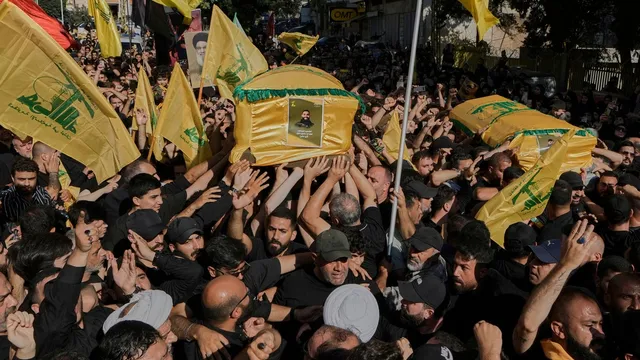
Israeli drone strike kills key figure involved in arms smuggling in Lebanon
2025-07-03 16:22- An Israeli drone strike targeted a car in Khaldeh, Lebanon, resulting in one death and three injuries.
- The Israeli military claimed the strike was aimed at a terrorist involved in arms smuggling for Iran's Quds Force.
- The attack reflects the ongoing tensions between Israel and Hezbollah, amid Israel's continued military operations in the region.
Express your sentiment!
Insights
On July 3, 2025, an Israeli drone strike occurred on a highway in Khaldeh, just south of Beirut, Lebanon. The attack resulted in the death of one individual, Qassem al-Husseini, identified as the driver of the targeted vehicle, along with injuries to three others. The Israeli military claimed that al-Husseini was a 'terrorist' associated with Iran's Quds Force, involved in weapon smuggling and plotting attacks against Israel. The intent of the strike was to target individuals thought to threaten Israeli security on behalf of Iranian interests. This incident took place in the context of ongoing tensions between Israel and Hezbollah, following a ceasefire that nominally ended a prolonged conflict between the two parties in November last year. Since the ceasefire, Israel has conducted near-daily airstrikes in Lebanon, asserting the strikes are aimed at suspected Hezbollah positions and militant networks. These actions have continued despite international efforts to stabilize the region and enforce disarmament agreements with Hezbollah. Reports from Lebanon's health ministry indicated that over 200 Lebanese civilians and combatants have died in Israeli attacks since the ceasefire, illustrating the ongoing risks associated with the military engagements in the area. Lebanon’s National News Agency reported that the airstrike occurred near a major commercial hub, causing further concern about civilian safety in the region. This particular drone strike was characterized as unusual due to its deep penetration into Lebanese territory, raising questions regarding Israel’s military operational strategy and response to perceived threats from Iran-backed groups. Moreover, the foreign relations associated with this incident illustrate the complexity of the geopolitical dynamics in the region. The Lebanese government under President Joseph Aoun has engaged in discussions with Hezbollah about the disarmament of militant groups, a condition emphasized in U.S.-brokered agreements. However, with Hezbollah's refusal to disarm and its insistence that Israel fully withdraw, the potential for future conflicts remains high, as both sides continue to posture militarily and politically. The implications of the drone strike are significant, as they not only escalate tensions between Israel and Hezbollah but also underscore Israel's broader concerns regarding Iranian influence in Lebanon. Such actions can trigger reprisals from Hezbollah or other Iranian proxies, leading to a cycle of violence that complicates peace efforts in a region already marked by instability and conflict.
Contexts
The history of Israeli strikes in Lebanon is a significant aspect of the ongoing conflict in the region, shaped by complex political, military, and social factors. The roots of these strikes can be traced back to the establishment of Israel in 1948 and the consequent territorial disputes that followed. Over the years, Lebanon has become a battleground, particularly for conflicts involving Israel, Palestinian factions, and Hezbollah. The Israeli military operations in Lebanon have been extensive, aiming to counteract perceived threats from these groups, which have frequently launched attacks against Israeli territory from Lebanese soil. Notable military operations include the 1982 Lebanon War, which resulted in a major invasion and a prolonged occupation of southern Lebanon, and the 2006 Lebanon War, triggered by Hezbollah's cross-border raids and the abduction of Israeli soldiers. These conflicts have not only resulted in military engagement but have also led to significant civilian casualties and displacement, further complicating the humanitarian situation in Lebanon. In response to cross-border incursions, Israel has implemented a strategy of pre-emptive strikes, targeting militant camps, weapon depots, and leadership figures associated with groups like Hezbollah. The rationale behind these operations is to deter future attacks and degrade the military capabilities of adversaries. Israel's military doctrine has evolved over the years, with a focus on intelligence-driven operations that highlight the importance of precision strikes intended to minimize collateral damage while achieving strategic objectives. However, these strikes have often drawn international scrutiny, particularly concerning adherence to international law and the principle of proportionality in armed conflict. Incidents resulting in civilian casualties have sparked widespread condemnation and have raised questions about Israel's military tactics and their implications for civilian populations in Lebanon. The international community, including organizations such as the United Nations, has frequently called for restraint and negotiations to address the root causes of the Israeli-Lebanese conflict. Efforts at diplomacy have yielded limited results, often collapsing under the weight of mutual distrust and ongoing hostilities. The disintegration of the Lebanese state apparatus, coupled with the rise of Hezbollah as a significant political and military entity, has complicated the peace process. Hezbollah's involvement in the Syrian Civil War has further entangled the situation, as it has positioned itself as a defender of Lebanese sovereignty against perceived external threats, including Israel. This has led to an escalation of hostilities and a protracted cycle of retaliation that has characterized Israeli-Lebanese relations. As of now, the ongoing tension between Israel and Hezbollah continues to pose a significant threat to stability not just in Lebanon, but in the broader Middle East. The potential for additional military confrontations remains high, driven by regional dynamics and internal Lebanese politics. Efforts for de-escalation and peacebuilding face considerable hurdles, highlighting the need for a comprehensive approach that addresses the underlying issues of security, sovereignty, and mutual recognition. The history of Israeli strikes in Lebanon thus represents not only a military narrative but also a complex tapestry of national aspirations, regional rivalries, and the enduring quest for peace in a conflict-ridden area.